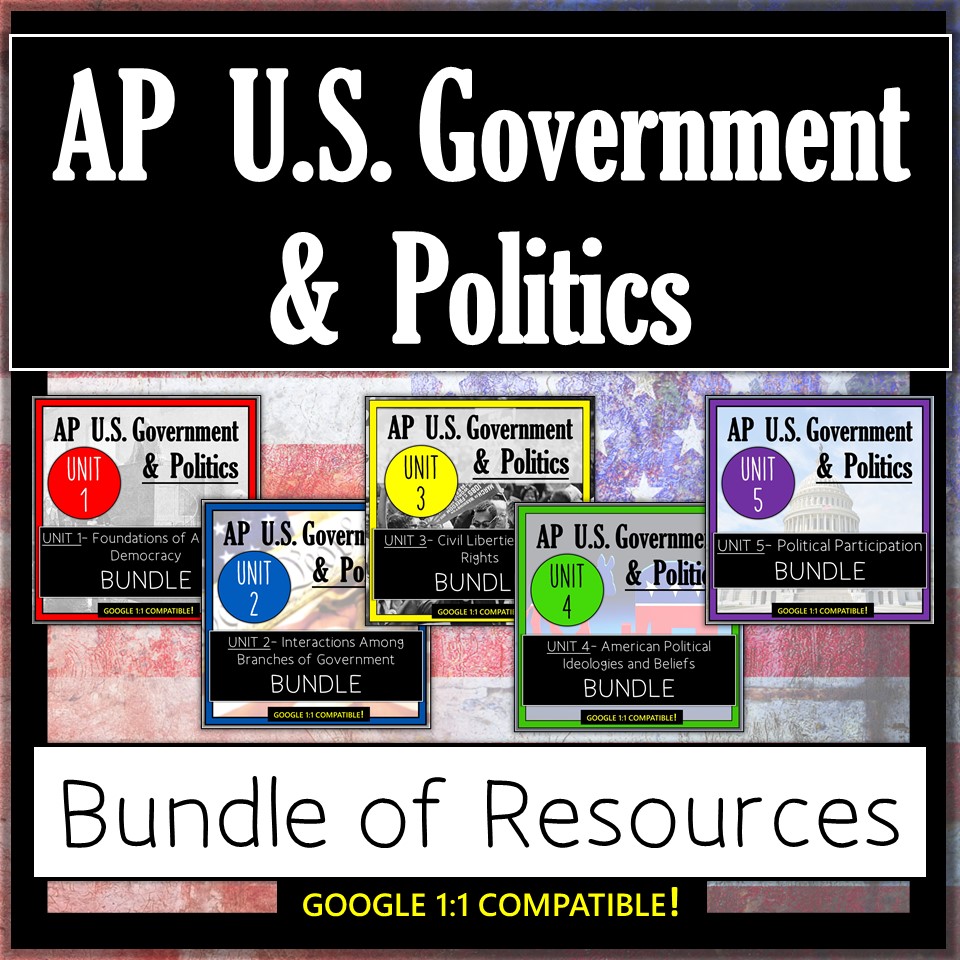Are you an AP U.S. Government and Politics amateur? I was too! I took on the task with only about 3 weeks before the school year began. It was intense; I actually felt bad that the AP students got stuck with me. HOWEVER (**here’s the good news**), I devoted a lot of time ensuring that I wasn’t a liability to the academic acceleration of my A-Type personality crew. By the end of the year, my students did very well on the exam, and, without sounding like a narcissist- they loved the class! Here are 5 Takeaways about how I went from an AP GoPo Amateur to an AP GoPo BOSS:
- Read. Instruct. Assess. Repeat.
After my students took the exam, I asked then to complete a survey. One of the questions was “Did you feel prepared for the exam?” 91% of my students said “yes”. I also asked a related question- “What was the best method for learning course content?” This was answered with a written response, but the overwhelming majority alluded to a combination of textbook reading assignments, teacher instruction on the textbook assignments, and final assessments with practice.
The course content can be overwhelming. I found that by creating a specific routine, it helped create an expected process for the students that allowed for consistent reiteration of content. Repetition = Retention. Here is an example of what I did:
- Assign Guided Reading Questions from the textbook for Unit 1 in chunks (i.e.- Unit 1.1-1.3, about 20-30 pages total). Students submit their responses for a small grade. I valued each textbook reading assignment at 10 points.
- Instruct students using a PowerPoint Presentation with Guided Notes on the same material from their textbook assignment. This reinforces what they learned independently, and also provides them with an opportunity to ask questions and gain a better understanding on content.
- Assess. Use informal assessments throughout, and a final formal assessment with a review day. Throughout the unit, I often project MCQ practice questions for a whole-class, informal assessment. I do the same with an FRQ or two. The discussion is great, and it reminds them that they are all in this together. I finish with a Final Unit Assessment that includes 20-or-so MCQ’s and one FRQ of choice. We have a review day beforehand that includes a game and study guide work.
- Repeat for each unit.
Wish that you had some of these materials to make prep work super easy? Keep reading! I have some options for you 😉
2. Debate, Debate, Debate!
There is something glorious about the determination of AP-minded students to debate! Of course, when they want to debate a grade they received, not so great. However, put those argumentative brains to good use! Here are two ways that I trick students into learning by using debates:
- A current-events, political analyst assignment that concludes with a Socratic Seminar. I am NOT kidding when I tell you that students have actually requested more of these assignments! As a teacher of a government and civics class, there are always topics that you can sporadically assign for research and debate. It is also important for students to know how to be media literate to disseminate fact-based information from opinion and bias. Want help doing this? Click here.
- Debate the Nine Foundational Documents. One example is with the Declaration of Independence. I assign the entire document to be read and annotated, but with a caveat: they have to argue if Thomas Jefferson was a drama queen, or a politically rational. I like to force them to debate one side by dividing the class in half prior to assigning it. Not only will they know the Foundational Document very-well, but they get to defend a position (using evidence, of course!) and debate with fellow classmates.
3. Teamwork Makes the Dream Work.
Political differences can create divisiveness. Unfortunately, the content that you teach will evoke contention and strong emotions. FROM THE START- create opportunities for students to work cooperatively. A small way to do this is to do practice activities as a whole class and/or in groups. I find that when I first begin teaching FRQ’s, students are very uncomfortable with the questioning and format. Therefore, I utilize that mutual discomfort with whole-class practice. I will project an FRQ, and randomly select students to participate- spreading the wealth. Then, I will assign another (same FRQ type, like the Data Analysis), and then put them in small groups of 2-3 students to answer together. Using collaboration often will allow students to have educated discussions that are respectful and purposeful.
4. Prioritize the Purpose.
Okay, so this philosophy may be difficult for AP students to conceptualize- so don’t tell them!
I decided that my AP GoPo course was important- not because students can earn college credit with a good score on the exam, but because I am teaching them to be well-educated and productive citizens. I invited students who have never taken an AP course into my class. I had other AP teaching co-workers question this move. They were concerned that my overall test scores would be low. I decided- I don’t care! And ironically enough, my students’ exam scores were on par with the other AP courses ;). If you prioritize the purpose of your course to mean more than the exam, the students will enjoy the course more, and it will show in their work.
5. Let the students Lead!
So… let’s be honest. Politically, the past few years have provided some top-notch material for drama and chaos. Because the subject matter of the course is combined with students who are naturally curious, let them take the lead once in a while! What I mean by this is, if some ground-breaking news rears its heads, and you have students coming into your class that cannot stop talking about it- take advantage! It might throw off your schedule, but be okay with that. I tend to be a control freak who plans purposefully, so this was difficult for me. But what I realized is that by letting the students lead, I am “prioritizing the purpose” that I explained above. During the 2020 election, students had sooooo many questions about fraud, illegal ballots, blah, blah, blah. How do I stop this? They cared about politics! I allowed them to shout out something that they had “heard” in regard to the election process. Then, as a class, we researched the legitimacy of those claims (they have 1:1 devices). Because they had completed several media literacy assignments by that point, they were aware of which online sources to use, and which to stay away from. In addition, we discussed federalism and how states have different election processes. We also looked into voting legislation in relation to mail-in ballots, and had amazing discussions (Look at that- I was able to sneak course content into their investigations)! It turned into two-days of very thoughtful conversations and insight as to what is legitimate information and what is not. How awesome!
Phew! I said a lot. But let’s get to what you could REALLY use at this point- some resources! I have put together a bundle with almost everything that I use to teach the course (click the image below). It is a growing resource, so as I continue developing my curriculum, I will add to the bundle (you get anything that is newly added for free just by re-downloading). Check out each product within the bundle, and the “HOW TO” in the Description section. I hope that all or some (or one!) of the products that I have available can help- it would have saved me TONS of time if these were available before I started. Good Luck on your path to being an AP GoPo Boss!


